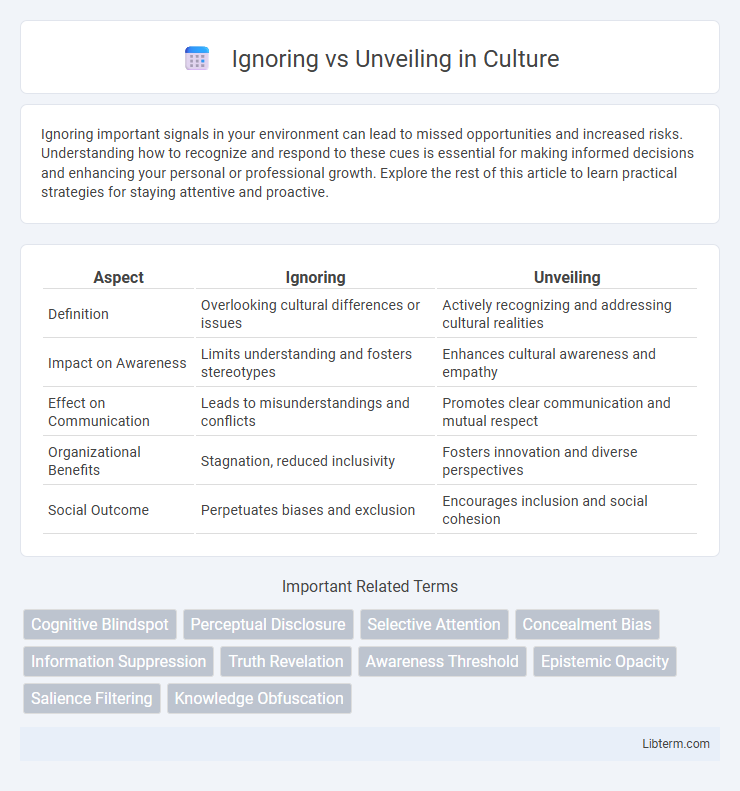Ignoring important signals in your environment can lead to missed opportunities and increased risks. Understanding how to recognize and respond to these cues is essential for making informed decisions and enhancing your personal or professional growth. Explore the rest of this article to learn practical strategies for staying attentive and proactive.
Table of Comparison
| Aspect | Ignoring | Unveiling |
|---|---|---|
| Definition | Overlooking cultural differences or issues | Actively recognizing and addressing cultural realities |
| Impact on Awareness | Limits understanding and fosters stereotypes | Enhances cultural awareness and empathy |
| Effect on Communication | Leads to misunderstandings and conflicts | Promotes clear communication and mutual respect |
| Organizational Benefits | Stagnation, reduced inclusivity | Fosters innovation and diverse perspectives |
| Social Outcome | Perpetuates biases and exclusion | Encourages inclusion and social cohesion |
Understanding the Concepts: Ignoring vs Unveiling
Ignoring involves consciously or unconsciously dismissing information, leading to gaps in knowledge and hindering decision-making processes. Unveiling reveals hidden truths or insights, enhancing comprehension and fostering informed actions. Understanding the concepts of ignoring versus unveiling is crucial for effective problem-solving and critical thinking strategies.
Psychological Impacts of Ignoring
Ignoring triggers feelings of rejection and invisibility, significantly increasing anxiety and depression symptoms in individuals. Chronic exposure to neglect can damage self-esteem and trust, leading to long-term emotional withdrawal and social isolation. The psychological toll of ignoring manifests in heightened stress responses and impaired cognitive functions, undermining overall mental health.
The Power of Unveiling Truths
Unveiling truths empowers individuals and communities by fostering transparency and informed decision-making, which counters misinformation and ignorance. The act of revealing hidden realities strengthens accountability and drives social progress through awareness and open dialogue. Ignoring critical facts, in contrast, perpetuates falsehoods, limits growth, and undermines trust within society.
Social Dynamics: What Happens When We Ignore?
Ignoring in social dynamics often leads to feelings of exclusion, decreased trust, and weakened relationships, as individuals perceive neglect and diminished social value. Unveiling hidden concerns or emotions fosters communication, empathy, and stronger connections by addressing misunderstandings and validating experiences. Persistent ignoring can escalate conflicts, increase social isolation, and reduce group cohesion, highlighting the importance of active engagement for healthy social interactions.
Unveiling Hidden Realities: Benefits and Risks
Unveiling hidden realities uncovers critical insights that drive informed decision-making, innovation, and social awareness, often revealing truths obscured by biases or misinformation. This transparency fosters accountability and trust but may expose sensitive information, leading to ethical dilemmas, privacy concerns, or unintended consequences. Balancing the benefits of awareness with the risks of vulnerability requires careful handling of revealed truths to maximize positive outcomes.
Ignoring as a Coping Mechanism
Ignoring serves as a coping mechanism by allowing individuals to temporarily bypass stressors and negative emotions, reducing immediate psychological distress. This intentional avoidance helps maintain emotional equilibrium when confronting overwhelming situations, especially in high-pressure environments. However, reliance on ignoring can lead to unresolved issues, potentially exacerbating long-term mental health challenges such as anxiety and depression.
Unveiling for Growth and Transformation
Unveiling hidden truths fosters profound personal growth and transformative change by encouraging self-awareness and authentic living. Embracing transparency and confronting challenges head-on unlocks new opportunities and catalyzes resilience. This conscious revelation shifts mindset, empowering individuals and organizations to evolve beyond limitations toward continuous improvement and success.
When to Ignore and When to Unveil
Ignoring minor issues in a project can save time and resources, especially when the problems do not impact overall goals or outcomes. Unveiling hidden challenges becomes essential when these issues threaten performance, security, or long-term success, requiring proactive intervention. Effective decision-making relies on assessing the potential risks and benefits to determine when to maintain focus or bring concerns to light.
Ignoring vs Unveiling in Relationships
Ignoring issues in relationships often leads to unresolved conflicts, emotional distance, and decreased trust between partners. Unveiling hidden feelings and concerns promotes open communication, fosters emotional intimacy, and strengthens mutual understanding. Addressing problems transparently helps build a resilient foundation, reducing misunderstandings and enhancing overall relationship satisfaction.
Strategies for Balanced Decision-Making
Effective decision-making balances ignoring irrelevant information and unveiling critical insights by prioritizing data that directly impacts objectives. Employing techniques like selective attention and structured analysis helps filter noise while uncovering actionable patterns. Integrating these strategies promotes clarity, reduces cognitive overload, and enhances outcome accuracy in complex environments.
Ignoring Infographic

 libterm.com
libterm.com